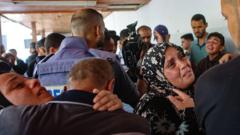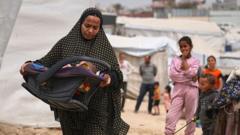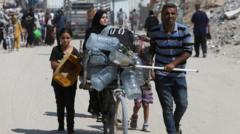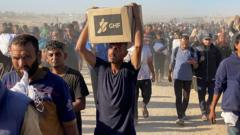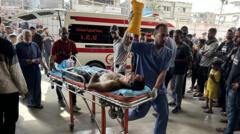Amid a devastating war in Gaza, expectant mothers confront dire conditions, with food shortages, inadequate medical support, and high rates of miscarriage and congenital issues placing both mother and child at grave risk.
The Dire Consequences of War: Pregnancy and Childbirth in Gaza
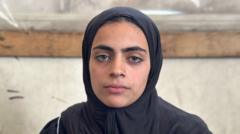
The Dire Consequences of War: Pregnancy and Childbirth in Gaza
As the Israeli blockade and bombardments continue, pregnant women in Gaza face increasing risks that threaten their lives and the health of their newborns.
Amid the ongoing conflict in Gaza, the plight of pregnant women and newborns has become increasingly dire. Reports indicate that acute shortages of food and medical supplies, exacerbated by the Israeli blockade, have led to alarming health outcomes for mothers and babies alike.
The UN reports that one in ten newborns is underweight, and there has been a troubling rise in miscarriages, stillbirths, and congenital abnormalities. At Nasser hospital in Khan Younis, due to the fear and instability from the bombings, expectant mothers like Malak Brees are terrified of premature labor, feeling that their circumstances are precarious. "The doctors told me it was due to malnutrition and exhaustion," she said, expressing her anxiety about her unborn child’s survival.
The blockade, largely intact since March, exacerbated the crisis, limiting access to essential medical supplies like painkillers and basic hygiene products. Reports reveal that some women are giving birth in makeshift shelters, away from medical care, while those who reach hospitals are often discharged within hours—far sooner than is advisable given their conditions and the health of their babies.
With many healthcare facilities crippled by attacks and the absence of adequate resources, over 55,000 pregnant women in Gaza struggle to access routine prenatal care. "The psychological state of the women at the point of childbirth is heartbreaking," said Dr. Ahmad al-Farra, highlighting the fears these women hold for their babies' survival.
The tragic story of Aya al-Skafi underscores the grim reality; her daughter Jenan, diagnosed with malnutrition and dehydration due to scarcity of food and formula, tragically passed away at just four months old. Aya’s anguish reflects the desperation of countless families finding it increasingly challenging to nourish their newborns.
Efforts are being made by groups such as the Gaza Infant Nutrition Alliance, which provides support and training for local medics to assist mothers during this trying time. However, the sustained turmoil has produced a landscape filled with despair, with mothers often unable to access vital support for breastfeeding or nutritional guidance.
Heart-wrenching stories abound, including that of a mother forced to deliver her child alone in a tent, unable to receive help until it was too late. As conflict continues, the dream of childbirth is overshadowed by fear and loss, making the arrival of new life in Gaza a stark reminder of the ongoing struggle for survival. In these circumstances, the hope that should accompany pregnancy is constantly juxtaposed with anxiety and grief, leaving communities to grapple with profound loss.




